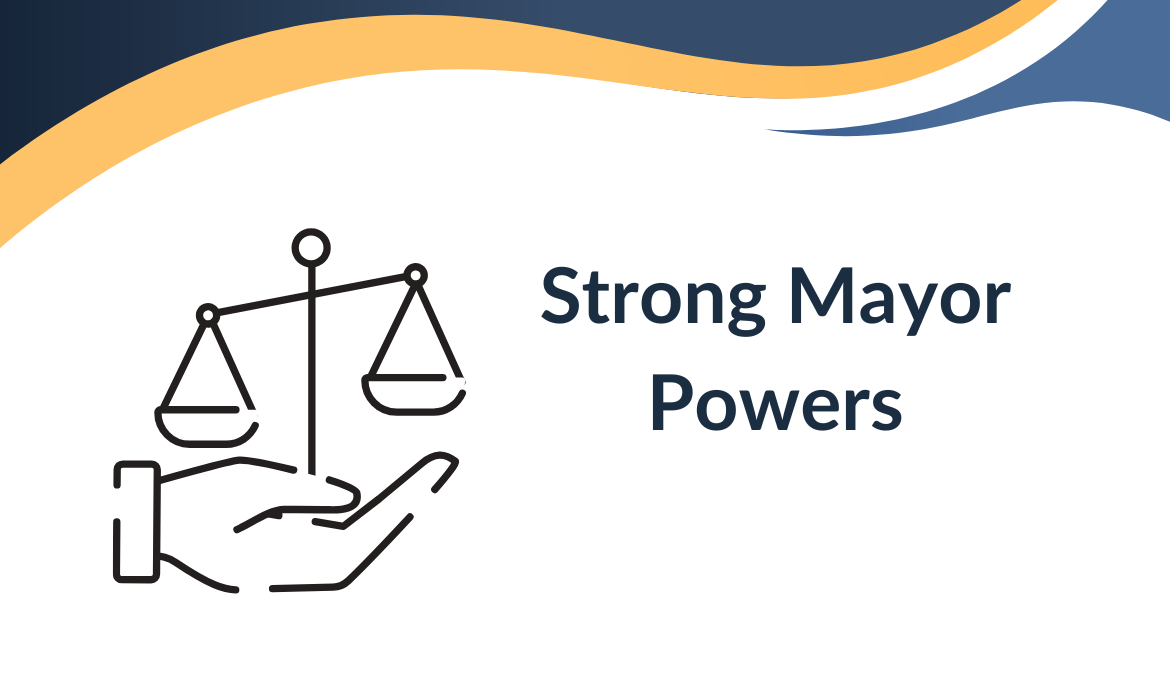Strong Mayor Powers
On July 8, Councillor Austin introduced a motion regarding strong mayor powers (link). It was timely and necessary. Rumours about potential changes had been circulating for months—well before the Morris Street controversy—and it was time to seek clarity and formally request that the province consult with HRM before making any changes to our governance structure.
As of now, I don’t know what specific powers are being considered. Without that information, it’s hard to imagine how they could benefit HRM residents. However, based on how strong mayor powers have been implemented elsewhere, I can offer some initial thoughts.
In Ontario, strong mayor powers have been introduced primarily to expedite housing and infrastructure projects. These powers allow mayors in select municipalities to propose certain by-laws tied to provincial priorities—like housing—and to bypass full council approval under specific voting thresholds. The stated goal is to streamline decision-making to address the housing crisis more efficiently.
Here in Nova Scotia, the provincial government has already introduced several tools to achieve the same objectives—without strong mayor powers. For example:
16 special planning areas have been established, including Sandy Lake and the Highway 102 West Corridor (Blue Mountain Birch Cove Lakes).
Bill 329 streamlines development approvals and increases housing density.
Minimum planning requirements updates to the Halifax Charter mandate new secondary planning strategies and land-use bylaws to support suburban growth.
Bill 24 grants the province authority over transportation infrastructure (e.g., roads and bike lanes), even at the municipality’s expense.
Given all of that, I question how strong mayor powers would further the province’s objectives, or expedite any housing or infrastructure agenda. The Province already has the legislative tools they need. In fact, I’d argue there’s no need to grant additional powers to the mayor at all. And unless the mayor’s priorities are entirely aligned with the province, giving any mayor more authority could set the stage for conflict between the council and the province.
In my view, council cannot serve two masters (and prior to this, I would have said we only serve the residents of HRM). The old adage, “Strong mayors don’t need strong mayor powers,” rings true, in my opinion, but I'd also tack on, “Strong premiers don’t need strong mayors, either.”
While Mayor Fillmore appears to welcome the idea of provincial intervention (article here), there are clear examples of how strong mayor systems have caused friction elsewhere. In Ontario, strong mayor powers were initially granted to John Tory and later passed on to Olivia Chow. As we’ve seen in a recent court ruling that overturned a decision to remove bike lanes on constitutional grounds (article here), Premier Ford and Mayor Chow remain at odds, and now Mayor McCabe of Waterloo has joined in as well in support of the court decision (article here). A protracted and expensive legal battle like that would not serve HRM well.
Mayor Fillmore has argued that change is needed at City Hall because too much power is concentrated in the hands of an unelected CAO (article here). It’s true that in some cities with strong mayor systems, the mayor has hiring and firing power over the CAO. Yet, just one day after the mayor’s remarks, CAO Cathie O'Toole announced her early retirement (article here).
On a personal note, I view this as a profound loss for the municipality. My experience with the CAO has been exceptional, and her neutrality, professionalism and subject matter expertise is both welcomed and vital.
Where the CAO was involved - 2025/26 budget - the mayor has seen great success in advancing his affordability agenda. Council was initially presented with a transitional budget that included a 7.5% tax increase, but it was explicitly designed to be shaped by council. The CAO provided a Budget Adjustment List with options that were openly debated, allowing council to land on a flat tax rate. That kind of collaboration shows what’s possible within the current system.
Most recently, the mayor stated on CBC’s Maritime Noon that he “reports to the CAO” (full audio here). Since then, both council members and the CAO have clarified that the CAO reports to Regional Council, of which the mayor is one member (article here). Some have called the mayor’s comment a “slip of the tongue” or “saying the quiet part out loud.” While the mayor's comments are his own and I cannot speak to his intent or meaning, I can say that my experience with staff and the CAO would never lead me to believe that there was a power struggle at play. If there was, I would be the first to tell you. I have no reason not to.
Finally, strong mayors are often granted broad budgetary discretion. I understand how that might be necessary if a mayor is driving infrastructure projects tied to provincial priorities. After all, budgets are fundamentally about infrastructure and services.
But with Bill 24, infrastructure will be predetermined by the province. In that context, strong mayor budgetary powers would mostly affect services. That raises serious concerns. Every decision about service cuts or enhancements—whether real or perceived—would be vulnerable to accusations of favoritism, nepotism, or worse.
Above all, that is my greatest fear: that we will undermine public trust in council, erode collaborative governance, and introduce division where unity is needed.


